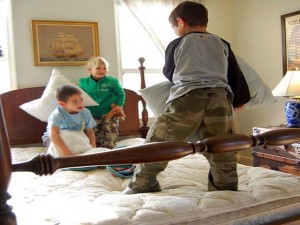
You’ve navigated infancy and the terrible-twos. Your little boy plays with other kids, and is actively exploring the world. One of the lessons that both of you will have to learn is this: roughhousing is critical to your son’s development.
You’ve likely had at least a few instances of play-dates that involved someone getting hurt during roughhousing. Rolling around on the floor, pushing and pulling each other – these are very important physical-play parts of your son’s development. Your job is to help your little boy learn the boundaries of acceptable behavior, which includes the right ways to engage in roughhousing.
Supervise playtime, without hovering. Being in the room, but not hands-on – unless you need to be – will help keep your little guy from hurting, or being hurt, while playing with other kids. It’s important that he learn the consequences of unacceptable behavior – biting and hitting, in particular – without losing the opportunity for the rough-and-tumble play that boys need to engage in to develop good social skills.
You should also start giving your little boy chores. Start with picking up his toys and putting them away in his toy box. A three year old can set the table for a family meal. If he forgets, you can let him realize the consequences by, when you all sit down at the table, asking, “Oh my, how are we going to eat?”
Chores let kids feel like they’re an important part of the family. It takes time, and reminding, and consistency – but setting these kind of expectations “early and often” will reap big rewards throughout your son’s life.
Let your son learn his physical limits, and connect with other kids, through roughhousing. Teach your son responsibility by giving him chores. He’ll take those lessons to school with him, and be classroom-ready.
In “The Parents’ Guide to Boys,” Dr. James lays out a brain-based approach to encouraging boys toward and through a successful school experience. In this blog post series, she shares some nuggets from the book to help parents learn what’s happening in their son’s developing brain, and guide him toward a love of learning.
